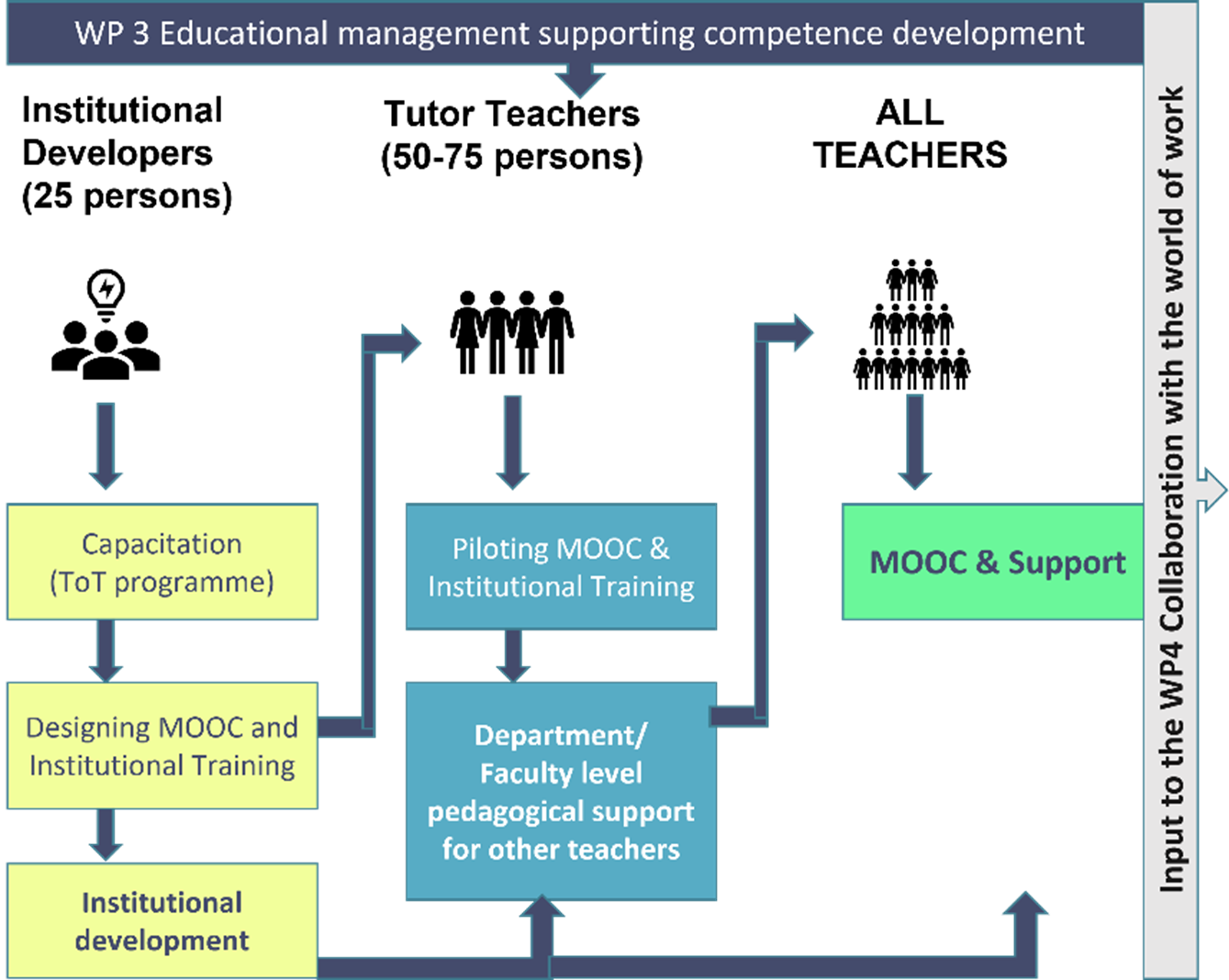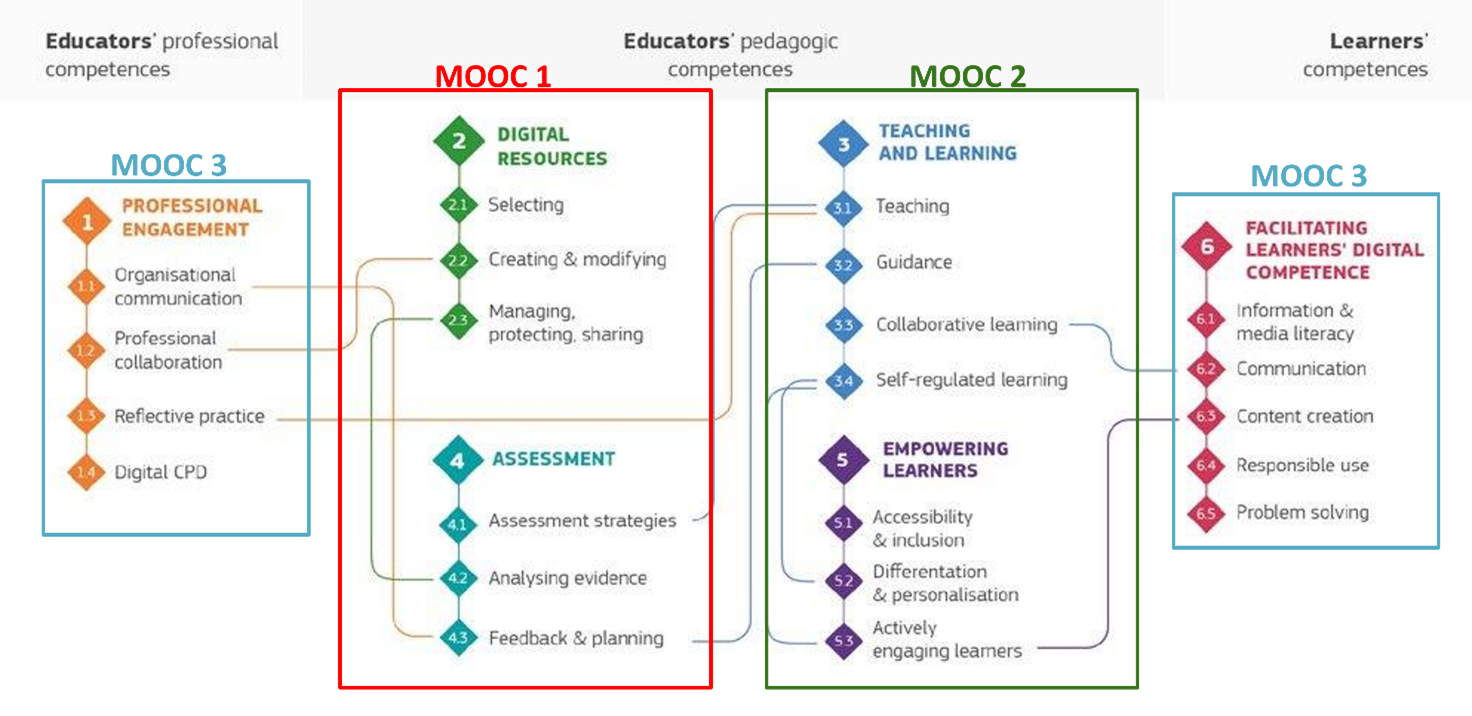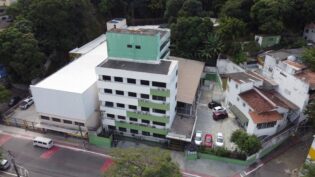Empowering Educators: Transforming Teaching through the EMBRACE Professional Development Program
Published 2 October 2024

Photo by: Embrace Team
The EMBRACE Professional Development Program enhances digital and pedagogical skills of higher education teachers in Brazil and Colombia, addressing gaps exposed by the COVID-19 pandemic. The initiative promotes teacher training, inclusive digital learning, and collaboration with the European DigCompEdu framework. Initial feedback highlights the program’s rich content, accessibility challenges, and its potential for transformative educational change.
The global digital transformation was accelerated by the COVID-19 pandemic, but it also revealed how decisive role disruptive innovation can play, leading to a sense of urgency about digital education and concerns over its quality. In post-Covid world, digital education is high on the political agendas of both the European Union and the Latin America and Caribbean. The rapid advance of new technologies like artificial intelligence, robotics, cloud computing and blockchain make investing in developing digital skills increasingly important. (e.g. Sabzalieva et al., 2024; Staring et al., 2022; European Commission, 2020)
In both continents, Europe and Latin America and Caribbean, there is a common understanding of the critical component in digital education, which is of course the competences of teachers, followed by leadership and the “digivision” of the institution, suitable digital content, and infrastructure (Sabzalieva et al., 2024; European Commission, 2020). There is still a significant gap in digital competences among teachers and Continuous professional development and training are essential to support digital transformation in higher education. In both Brazil and Colombia, there are national policies or strategies that emphasize these digital development aspects in education, for example: Política Nacional de Educação Digital (2023, recently passed into a law in Brazil) that promotes the improvement of teachers’ digital skills to create pedagogical innovation in the teaching and learning processes, with the reinforcement of analytical and critical skills, ethics applied to the digital environment, media literacy and citizenship in the digital age (Government of Brazil, Presidency of the Republic, 2024; Ivenicki, 2024), and Estrategia Nacional Digital de Colombia 2023 – 2026 that aims to position Colombia as a leader in digital innovation and inclusivity, driving sustainable development and social equity through comprehensive digital transformation (Government of Colombia, 2023).
Education can benefit from opening traditional classrooms to digital spaces and learners can be empowered by new digital possibilities, tools, and environments. During the COVID-19 pandemic, the research shows that digital transformation can increase access to higher education, particularly in remote areas, and that universities can play a crucial role in supporting digital literacy in their communities. Access to and the use of digital technologies can help reduce the learning gap between students from high and low socioeconomic backgrounds, and digitalization supports more flexible educational pathways and internationalization, recognizing competences acquired outside traditional formats and promoting microcredentials. (e.g. Sabzalieva et al., 2024; Ivenicki, 2024; European Commission, 2020)
However, the COVID-19 pandemic also exposed the emergence of digital divide and underscored the need to ensure access, equity, and inclusion. The situation varied between countries and contexts, for example, according to Ivenicki (2024) in multicultural and unequal countries such as Brazil, there were mixed effects related to multicultural and equity sensitive concerns related to the access to digital artefacts, as well as to the articulation of digital learning and curriculum practices. Moreover, the research shows that there is an evolving need for media literacy and a wide mix of skills related to digital ethics, safety, and security, as well as privacy and data protection. (e.g. Sabzalieva et al., 2024; Ivenicki, 2024; European Commission, 2020)
Considering these, it is pivotal to discuss what meaningful and quality digital learning means in the context of higher education, and to what extent teachers are equipped with digital technologies and curricular and pedagogical strategies aimed at fostering that kind of learning. We should also find ways to harness digital transformation to improve equity and social justice within the local contexts where digital learning is developed. The EMBRACE project is tackling with these issues starting with the professional development of teachers’ digital and pedagogical competences and moving on to the establishment of professional learning communities and institutional support mechanisms, as well as to the transformative leadership from the directors and managers in partner institutions.
EMBRACE Professional Development Program
One of the three main objectives of the EMBRACE project is to enhance the digital and pedagogical competence of higher education teachers to effectively plan, implement, and assess student-centered and competence-based (online) education. Thus, the project kicked off with the cascading process of teachers’ competence development facilitated by the Coordinator Häme University of Applied Sciences (HAMK) in collaboration with the partners. The process included three steps: 1) Professional Development program for the selected 25 teachers, five from each partner institution in Brazil and Colombia, 2) training process for 50-75 Tutor Teachers from the Brazilian and Colombian institutions, and 3) Massive Open Online Course for wider educational community (see Figure 1 below).

In the first phase, the aim of the Professional Development program was to deepen the competences of the teachers to become change agents and Institutional Developers, who have a wider perspective on educational and pedagogical development. These teachers had weekly 2-hours online training session between September-December 2023, altogether 14 sessions on various topics such as: principles of student-centered education, dialogue and wellbeing in learning, innovative pedagogy, digital tools and gamification, learning design, inclusion and accessibility, competence-based education, collaboration with the world of work, multidisciplinary innovation pedagogy, and teacher as a developer through practice-based research. The program also included hands-on collaborative assignments on various topics. Further, the participating teachers were provided with four thematic and semi-structured online guidance sessions, one hour per session per institution, to support the change agency of the teachers.
Alongside with the training, the Institutional Developers designed and constructed three Massive Open Online Courses (MOOCs) related to MOOC1 Digital pedagogy, MOOC2 Active pedagogy, and MOOC3 Collaboration with the World of Work. The partners decided to use the European Framework for the Digital Competence of Educators (DigCompEdu) for the design of the competences and contents of the MOOCs (see Figure 2 below).

DigCompEdu is a research-based framework describing the competences of a digitally competent teacher. The framework is applicable to educators at all levels of education, from early childhood to higher and adult education, including general and vocational education and training, special needs education, and non-formal learning contexts (Punie & Redecker, 2017). The Figure 2. describes how the DigCompEdu competences are addressed in the three MOOCs.
In addition, the Institutional Developers designed a training process for the Tutor Teachers in their institutions, which is implemented in the second phase of the cascading model including both piloting of the MOOCs and additional online or face-to-face sessions to reflect the topics of the MOOCs to deepen the understanding of the Tutor Teachers and to discuss their future role as pedagogical mentors for their colleagues. The feedback of the Tutor Teachers is used for the further development of the three MOOCs.
The third phase includes the launch of the three MOOCs to the wider educational community in Latin America, and internationally. The launch is expected to take place in the beginning of the year 2025.
First initial reflections from the participating teachers
The process with the training program is still ongoing, however, the first feedback received from the participating teachers has been quite positive. The MOOCs were seen high quality and rich in content; perhaps more interaction could be built in. Some development areas were highlighted such as accessibility of the chosen tools and resources, as well as the MOOCs, models, and materials produced in the project, an aspect that was highlighted also in the research on digitalization during and post-pandemic situation.
“Reflecting on the online training sessions offered in the EMBRACE project, I highlight the content extremely enriching, especially due to the student-centred approach, which introduced new forms of assessment and valuable reflections on the teaching-learning process. However, as a visually impaired person, I faced some accessibility challenges in certain aspects of the training…”
“Group work was a valuable moment for consolidating learning, allowing for active participation and recording of the content discussed… there was not enough time for everyone to contribute fully”
“As an institutional developer, I see that the first step in promoting inclusive pedagogical changes at UFABC would be to implement the knowledge acquired during the training… I highlight the importance of forming partnerships between teachers, working in pairs during didactic activities, both in person and remotely, to explore and facilitate the use of digital tools.”
Júlio F. B. Facó (Institutional Developer, UFABC)
References:
- European Commission (2020). Digital Education Action Plan 2021-2027: Resetting education and training for the digital age, available at: https://ec.europa.eu/education/sites/education/files/document-library-docs/deap-communication-sept2020_en.pdf
- Ivenicki, A. (2024). Digital Learning and Higher Education in Brazil: A Multicultural Analysis. Journal of Comparative & International Higher Education, 16 (2), pp. 127-135.
- DOI: 10.32674/jcihe.v16i2.5846
- OECD (2023). Country Digital Education Ecosystems and Governance: A Companion to Digital Education Outlook 2023. OECD Publishing, Paris, https://doi.org/10.1787/906134d4-en. Available at: https://www.oecd-ilibrary.org/deliver/906134d4-en.pdf?itemId=%2Fcontent%2Fpublication%2F906134d4-en&mimeType=pdf
- Government of Brazil, Presidency of the Republic (2024). Lei L14533 institui a Política Nacional de Educação Digital (PNED), available at: https://www.planalto.gov.br/ccivil_03/_ato2023-2026/2023/lei/L14533.htm
- Government of Colombia (2023). Estrategia Nacional Digital de Colombia 2023 – 2026, available at: https://www.mintic.gov.co/portal/715/articles-334120_recurso_1.pdf
- Punie, Y., editor(s), Redecker, C. (2017). European Framework for the Digital Competence of Educators: DigCompEdu, Publications Office of the European Union, Luxembourg, doi:10.2760/178382 (print),10.2760/159770 (online). Available at: https://publications.jrc.ec.europa.eu/repository/handle/JRC107466
- Sabzalieva, E., Chacón, E., Estrela Pereira, A., Valentini, A., Gamarra Caballero, L. & Abdrasheva, D. (2024). Transforming the digital landscape of higher education in Latin America and the Caribbean. The United Nations Educational, Scientific and Cultural Organization, Paris, France. Available at: https://unesdoc.unesco.org/ark:/48223/pf0000388361
- Staring, F., Brown, M., Bacsich, P. & Ifenthaler, D. (2022). Digital Higher Education: Emerging Quality Standards, Practices and Supports, OECD Education Working Paper No. 281. https://dx.doi.org/10.1787/f622f257-en



